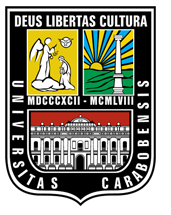CREATIVIDAD Y EDUCACIÓN ARTÍSTICA PARA LA TRANSFORMACIÓN DIGITAL SOSTENIBLE EN LA EDUCACIÓN SUPERIOR
DOI:
https://doi.org/10.54139/revfaces.v3i1.259Palabras clave:
creatividad, tecnología, sostenibilidad, educación superior.Resumen
La transformación digital en el sector educativo ha implicado profundos cambios, con el fin de adaptarse a lo impuesto por las nuevas tecnologías. En este contexto, la creatividad favorece la generación de ideas que aportan criterios sostenibles a las acciones realizadas por las instituciones superiores. Se plantea una revisión sistemática de la literatura durante el período 2009-2019. Las investigaciones sobre este tema han sido analizadas y estudiadas. Se concluye que las Instituciones de Educación Superior están avanzando en garantizar la gestión de su sostenibilidad económica, ambiental y social en relación con la transformación digital y el desarrollo de habilidades creativas para logar así el modelo requerido por los estudiantes como institución abierta, digital e innovadora.
Descargas
Citas
Abad Segura, Emilio, González Zamar, Mariana Daniela, Infante-Moro, Juan Carlos, y Ruipérez García, Germán (2020a). Sustainable Management of Digital Transformation in Higher Education: Global Research Trends. Sustainability, 12(5), 2107. DOI: https://doi.org/10.3390/su12052107
Abad Segura, Emilio, González Zamar, Mariana Daniela, Luque-de la Rosa, Antonio, y Morales Cevallos, María Belén (2020b). Sustainability of Educational Technologies: An Approach to Augmented Reality Research. Sustainability, 12(10), 4091. DOI: https://doi.org/10.3390/su12104091
Androutsos, Athanassios y Brinia, Vasiliki (2019). Developing and piloting a pedagogy for teaching innovation, collaboration, and co-creation in secondary education based on design thinking, digital transformation, and entrepreneurship. Education Sciences, 9(2), 113. DOI: https://doi.org/10.3390/educsci9020113
Berawi, Mohammed Ali (2018). The fourth industrial revolution: Managing technology development for competitiveness. International Journal of Technology, 9(1), 1-4. Int. J. Technol. 2018, 9, 1 DOI: https://doi.org/10.14716/ijtech.v9i1.1504
Boeren, Ellen (2019). Understanding Sustainable Development Goal (SDG) 4 on “quality education” from micro, meso and macro perspectives. International Review of Education, 65(2), 277-294. DOI: https://doi.org/10.1007/s11159-019-09772-7
Brown, Susan (2014). Conceptualizing digital literacies and digital ethics for sustainability education. International Journal of Sustainability in Higher Education. DOI: https://doi.org/10.1108/IJSHE-08-2012-0078
Cavanaugh, Jean Michael, Giapponi, Catherine y Golden, Timothy (2016). Digital technology and student cognitive development: The neuroscience of the university classroom. Journal of Management Education, 40(4), 374-397. DOI: https://doi.org/10.1177/1052562915614051
Cheng, Mo Yin Vivian (2019). Developing individual creativity for environmental sustainability: Using an everyday theme in higher education. Thinking Skills and Creativity, 33, 100567. DOI: https://doi.org/10.1016/j.tsc.2019.05.001
Colombo, Armando, Karnouskos, Stamatis, Kaynak, Okyak, Shi, Yamg, y Yin, Shen (2017). Industrial cyberphysical systems: A backbone of the fourth industrial revolution. IEEE Industrial Electronics Magazine, 11(1), 6-16. DOI: https://doi.org/10.1109/MIE.2017.2648857
Du Toit, J., y Verhoef, A. H. (2018). Embodied digital technology and transformation in higher education. Transformation in Higher Education, 3(1), 1-8. DOI: https://doi.org/10.4102/the.v3i0.52
Formánková, Sylvie, Kučerová, Renata, y Hrdličková, Andrea (2018). International standards of social responsibility and their suitability for high educational institutions. World Review of Entrepreneurship, Management and Sustainable Development, 14(1-2), 156-170. DOI: https://doi.org/10.1504/WREMSD.2018.10009036
Foulger, Teresa, Graziano, Kevin, Schmidt-Crawford, Denise, y Slykhuis, David (2017). Teacher educator technology competencies. Journal of Technology and Teacher Education, 25(4), 413-448.
Ghemawat, Pankaj (2017). Strategies for higher education in the digital age. California Management Review, 59(4), 56-78. DOI: https://doi.org/10.1177/0008125617717706
Ghosn-Chelala, María (2019). Exploring sustainable learning and practice of digital citizenship: Education and place-based challenges. Education, Citizenship and Social Justice, 14(1), 40-56. DOI: https://doi.org/10.1177/1746197918759155
González-Zamar, Mariana Daniela y Abad-Segura, Emilio (2020). Implications of Virtual Reality in Arts Education: Research Analysis in the Context of Higher Education. Education Sciences, 10(9), 225. DOI: https://doi.org/10.3390/educsci10090225
Grigorenko, Elena (2019). Creativity in Digital Reality/Creatividad en la realidad digital. Estudios de Psicología, 1-23. DOI: https://doi.org/10.1080/02109395.2019.1660122
Gurung, Binod y Rutledge, David (2014). Digital learners and the overlapping of their personal and educational digital engagement. Computers y Education, 77, 91-100. DOI: https://doi.org/10.1016/j.compedu.2014.04.012
Hanemann, Ulrike (2019). Examining the application of the lifelong learning principle to the literacy target in the fourth Sustainable Development Goal (SDG 4). International Review of Education, 65(2), 251-275. DOI: https://doi.org/10.1007/s11159-019-09771-8
Herring, Mary, Thomas, Tommye, y Redmond, Pamela (2014). Special editorial: Technology leadership for preparing tomorrow's teachers to use technology. Journal of Digital Learning in Teacher Education, 30(3), 76-80. DOI: https://doi.org/10.1080/21532974.2014.891875
Huang, Qinlong (2015). Digital Transformation of Education Publishing in China. Publishing Research Quarterly, 31(4), 258-263. DOI: https://doi.org/10.1007/s12109-015-9421-8
Jahnke, Isa y Kumar, Swapna (2014). Digital didactical designs: Teachers’ integration of iPads for learning-centered processes. Journal of Digital Learning in Teacher Education, 30(3), 81-88. DOI: https://doi.org/10.1080/21532974.2014.891876
Klimenko, Olena (2008). La creatividad como un desafío para la educación del siglo XXI. Educación y educadores, 11(2), 191-210
Kop, Rita y Hill, Adrian (2008). Connectivism: Learning theory of the future or vestige of the past? The International Review of Research in Open and Distributed Learning, 9(3). DOI: https://doi.org/10.19173/irrodl.v9i3.523
Mahlow, Cerstin y Hediger, Andreas (2019). Digital Transformation in Higher Education—Buzzword or Opportunity? eLearn, 2019(5). DOI: https://doi.org/10.1145/3329488/3331171
Newhouse, Paul; Cooper, Martin y Pagram, Jeremy (2015). Bring your own digital device in teacher education. Journal of Digital Learning in Teacher Education, 31(2), 64-72. DOI: https://doi.org/10.1080/21532974.2015.1011292
Sandri, Orana (2013). Exploring the role and value of creativity in education for sustainability. Environmental Education Research, 19(6), 765-778. DOI: https://doi.org/10.1080/13504622.2012.749978
Saykili, Abdullah (2019). Higher education in the digital age: The impact of digital connective technologies. J. Educ. Technol. Online Learn, 1-15. DOI: https://doi.org/10.31681/jetol.516971
Shrivastava, Anshuman (2018). Using connectivism theory and technology for knowledge creation in cross-cultural communication. Research in Learning Technology, 26. DOI: https://doi.org/10.25304/rlt.v26.2061
Siemens, George y Conole, Grainne (2011). Connectivism: Design and delivery of social networked learning. International Review of Research in Open andDistance Learning, 12(3). DOI: https://doi.org/10.19173/irrodl.v12i3.994
Stables, Kay (2009). Educating for environmental sustainability and educating for creativity: actively compatible or missed opportunities? International Journal of Technology and Design Education, 19(2), 199-219. DOI: https://doi.org/10.1007/s10798-008-9077-1
Syam, Niladri y Sharma, Arun (2018). Waiting for a sales renaissance in the fourth industrial revolution: Machine learning and artificial intelligence in sales research and practice. Industrial Marketing Management, 69, 135-146. DOI: https://doi.org/10.1016/j.indmarman.2017.12.019
Trencher, Gregory, Yarime, Masaru, McCormick, Kes, Doll, Christopher y Kraines, Steven (2014). Beyond the third mission: Exploring the emerging university function of co-creation for sustainability. Science and Public Policy, 41(2), 151-179. DOI: https://doi.org/10.1093/scipol/sct044
Zhu, Chang (2015). Organisational culture and technology-enhanced innovation in higher education. Technology, Pedagogy and Education, 24(1), 65-79. DOI: https://doi.org/10.1080/1475939X.2013.822414






